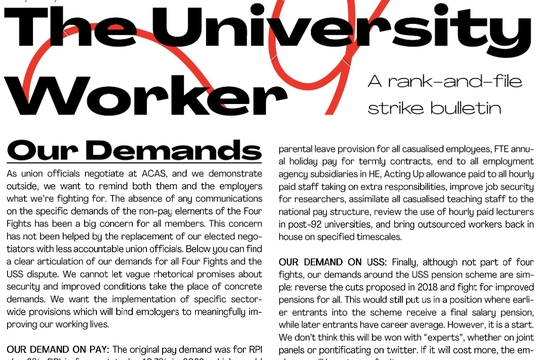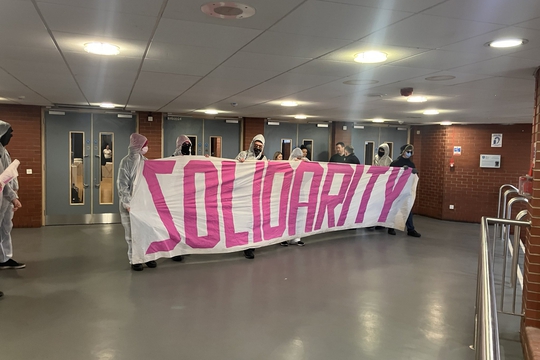Let us be crystal clear: this is shit

bulletins
Let us be crystal clear: this is shit
by
The University Worker
/
Feb. 17, 2023
A response to calling off the strike action
Today’s announcement has unilaterally called off the next two weeks of strikes. Members should have been consulted before this decision was made. Given that the elected negotiators of this dispute have been replaced by paid officials, the lack of consultation over this decision shows a shocking lack of democratic accountability. This has become, unfortunately, a running theme in the dispute so far.
Join us for a demonstration at the UCU head office in London at 5pm on Monday 20th of February. Read on for more details about the offer and what next.
What is the offer?
The details of the offer are thin, with little to go on other than a video and some brief details. There are a few parts that appear to outline what the “offer” from the employers is:
UCEA are currently consulting their members with a recommendation that they give them a mandate to end the use of involuntary zero hour contracts on campus
- This takes the massive risk of suspending strike action for 2 weeks (7 days of strike action) on the assumption that UCEA is going to compel member institutions to agree to its recommendation.
- If UCEA now knows that paltry allusions to consulting their members on single issues can diminish the length of industrial action, they will continue to do this over every issue in the dispute.
- Agreeing to ending the use of zero hour contracts without guaranteeing the transfer of existing zero hour contract workers to permanent contract risks massive cuts.
- This does nothing to address the pervasive misuse of fixed-term contracts in the sector - a practice which is far more normalised within the sector than the use of zero hour contracts.
In our pay and working conditions negotiations we are establishing time limited negotiations for new agreements on: tackling casualisation
- No specifics. We need concrete binding measures on tackling casualisation, not good will. See our last bulletin for a list of concrete demands.
- No reference to this agreement being binding on all employers - a key sticking point of previous negotiations over casualisation.
- If accepted without explicit reference to its binding effect, this agreement would ultimately be left to individual university managers to honour whatever provisions are included. Given how university managers generally relate to best practice guides, there is no reason to believe they would carry out these changes without any leverage or accountability being exerted on them.
I am delighted to announce the beginning of a process that will restore your pension, that will potentially lead to a reduction in the percentage of your salary that you pay into it every year. Your pension back and your contributions lowered would be a win win.
- No specifics. While restoring our pensions is important, this does not explain what it is being restored to. Previous cuts have ended the final salary scheme, changed accrual rates, and contribution levels. We need to know what the pension is being restored to.
- A reduction in contributions would be an improvement, but without confirmation or any concrete figures this is meaningless.
We will also agree the removal of the lowest point from the pay scale, and a review of the pay spine that will benefit everyone, especially the lowest paid … The offer on pay, whilst not significantly improved, has improved some and has been remodelled to ensure the lowest get paid more.
- No specifics beyond removing the lowest point from the pay scale. At many institutions this may not result in any pay uplift.
- No reference to Four Fights demand of RPI + 3% or 13.7%
- It is worth comparing this to the UCEA statement, which notes “Both parties agreed that further progress was made on the uplift at the lower end of the pay spine and that a pay impasse, rather than an agreement, has been reached. This completes the negotiations and discussions for pay, agreed as the priority phase by both parties in a bid to provide some early pay uplift six months early.”
We are establishing time limited negotiations where parameters will be defined in advance for a new agreement about improving work life balance and reducing your workloads
- No specifics. This just mentions the issues and explains there will be negotiations.
- No reference to the Four Fights 35 hour maximum working week demand, health and safety, or payment for unpaid labour.
We will launch meaningful negotiations on equality pay gaps, with data collection, monitoring and clear expectations
- No specifics.
- No reference to Four Fights demands on equality pay gaps or any concrete date or specific action. There is reference to an audit, but there is no detail other than data collection about what that will involve.
Why calling off strikes is shit
We’ve been here before in the UCU disputes. In 2018, we argued that it was a mistake to call off strikes during the ACAS negotiations. As Sam Morecroft has pointed out on Twitter, so too did Jo Grady at the time, when she posted: “Continuing action during ACAS is not only the right move, but a clear signal from UCU that they are not backing down. Demonstrates our strength to UUK.” In 2018 it soon led to an attempt to sell out the dispute. So what has changed now?
Union leaders do not win disputes - although sometimes they do lose them. Disputes are won through the collective power of members, often through striking, to force the employers to make concessions. UCU members are no strangers to being treated like a stage army that can be called out when the leadership wants, and told to go back to work when they don’t think our action is useful anymore.
Continuing the strikes keeps the action in the hands of the membership, with the possibility of escalating action. Calling off the strikes forces us back into work (and often to deliver classes that we haven’t had the time to prepare for!) and will make the reballot harder. We could have made the reballot a collective project on the picket lines, mobilising together to get the vote out.
The most worrying thing about calling off the strikes is the lack of democracy in the process. We voted to go on strike, we worked to get other members to vote to pass the thresholds, we organised picket lines, we raised money, and we built connections with other disputes that are ongoing. Now we’re being told we have to stop.
What can we do about it?
As in previous disputes, we need to put pressure on both the employers and the union to get the kind of victory we’re all fighting for. While there have been changes in the union of the past few years, the game hasn’t changed. We need to make sure that decisions in the union are taken by members. If decisions are made without us, we have to find ways to have our voices heard. We’ve had to demonstrate outside of UCU before.
There are three main things that we can do next:
-
Make sure the reballot is a success. Calling out the problems with the negotiations and the strategy can only be solved if we’re in the position to take more action.
-
Send contributions about what to do next to the University Worker to continue the debate. You can join our WhatsApp announcement group to keep in touch.
-
Join us for a demonstration at the UCU head office in London at 5pm on Monday 20th of February.
Join us from 5pm on Monday 20th Feb outside UCU head office, Carlow St, London NW1 7LH
author
The University Worker
Subscribe to Notes from Below
Subscribe now to Notes from Below, and get our print issues sent to your front door three times a year. For every subscriber, we’re also able to print a load of free copies to hand out in workplaces, neighbourhoods, prisons and picket lines. Can you subscribe now and support us in spreading Marxist ideas in the workplace?
Read next

The University Worker: 14th Feb 2023
by
The University Worker
/
Feb. 13, 2023

